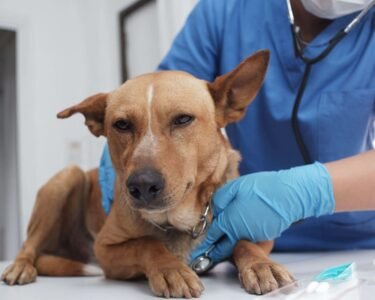Hi folks, your friend Tuki coming to you from my perch at the Potter League. I know that all you pet parents out there want to keep your pets safe and healthy, so you give your pets the best food, toys to play with, and regular visits to the veterinarian (even if your pet doesn’t really like that last one!). Another important thing to think about is avoiding things that can make them sick – or worse! March 17-23 is National Poison Prevention Week, so it’s time to think about those common things your pet might encounter that don’t hurt humans but can be dangerous for pets.
Food
- Alcohol: You may want to enjoy a nice glass of wine or a beer with your dinner, but you should avoid letting your pets indulge. Alcohol can cause depression of the central nervous system, which can lead to difficulty breathing, coma, and even death.
- Chocolate and Coffee: Chocolate and coffee are made from cacao seeds and fruit, and can cause vomiting and diarrhea, heart problems, and seizures. Dark chocolate is the most dangerous, but you should avoid feeding your pet any type of chocolate or coffee.
- Fruits: Grapes and raisins may cause kidney failure in pets. Other fruits like oranges, lemons, and coconuts (including coconut milk and coconut water) are likely to cause an upset stomach if eaten in small amounts but can cause more problems if eaten in larger amounts.
- Milk and Dairy Products: Although you may see pictures of a cute kitten drinking a saucer of milk, pets cannot digest milk from other animals, and it will likely cause stomach upset and diarrhea.
- Vegetables: Any vegetables in the onion family, including onions, chives, leeks, and garlic, can cause damage to red blood cells and lead to anemia. Cats may be more susceptible, but dogs are also at risk.
- Xylitol: I know you’re thinking, ‘I’ve never heard of this food,’ and while xylitol isn’t really a food, it is used as a sweetener in a lot of things like candy and gum and can cause liver failure in pets. While your pet may not chew gum, xylitol may also be used in diet or low-fat products such as peanut butter, and I’ve never met a dog who didn’t like peanut butter, so be sure to check the label before you buy!
Household Products
- Carpet Freshener and Shampoo: Most of these products are safe for pets if used according to the label directions. If your pet comes into contact with newly-applied carpet freshener powder, wash their paws to prevent any irritation or licking.
- Bleach: Most products containing bleach can be used to clean pet areas and toys if used and diluted correctly. Allow any bleach products to dry completely before your pet has access, and if the smell is still strong, open a window or use a fan to remove the smell. Be sure to get rid of any cleaning products quickly after using and put away sponges, mops, and buckets so your pet won’t ingest any leftover solutions.
- Toilet Cleaning Tablets: If your pet enjoys a drink from the toilet now and then, they might get an upset stomach if you use toilet cleaning tablets. And the toilet does contain bacteria, so you might want to leave the lid down to prevent drinking!
- Essential Oils: Essential oils can cause pneumonia if inhaled (e.g., diffuser or plug-in air freshener) and liver damage if ingested. Different types of oils have different levels of toxicity, so you should not use them in pet living areas.
- Scented Cat Litter: Most scented litters contain only a small amount of scented oil and are safe for most cats. If your cat has respiratory problems or is sensitive to scents, it may be best to avoid them.
Plants: Many house and garden plants can be toxic to dogs and cats, so thorough research before purchasing any plants for your home or garden is crucial. Some common plants, such as lilies, azaleas, and poinsettias, can be harmful or even deadly to pets if ingested. Familiarize yourself with the specific plants that may pose a threat, and opt for pet-safe alternatives when decorating your living spaces or garden. Keep plants out of your pets’ reach and consider creating designated pet-friendly areas to minimize the risk of accidental ingestion. If you’re unsure about a specific plant, consult with your veterinarian to ensure the safety of your furry friends.
Rodenticides: Rat and mouse poisons are designed to attract animals, but they pose a severe risk to pets if ingested and can also harm wildlife. Keep these products inaccessible to your pets, and use pet-safe alternatives for pest control. To minimize the impact on both your pets and the environment, consider alternative, non-lethal means for rodent control. Employing methods such as traps or natural deterrents can help manage rodent issues without putting your pets or local wildlife at risk. Ensure that any traps or deterrents used are pet-safe and placed in locations inaccessible to your furry friends. By choosing non-lethal methods, you contribute to a safer environment for your pets and the wildlife in your community.
Insecticides: Some insecticides, designed to eliminate pests, may contain chemicals that pose a potential risk to pets. These chemicals can lead to adverse effects if ingested, inhaled, or if they come into contact with your pet’s skin. To safeguard your pets and minimize their exposure to harmful substances, it is crucial to follow label instructions meticulously when using insecticides.
Marijuana: While marijuana may be legal or commonly used in some places, it can pose serious risks to your pets. Dogs, in particular, are more sensitive to THC, the psychoactive compound in marijuana. Ingesting marijuana can lead to symptoms such as lethargy, vomiting, incoordination, and even seizures. It’s crucial to keep any marijuana products, including edibles and joints, out of reach of your pets. If you suspect your pet has ingested marijuana, contact your veterinarian immediately. Be cautious during any outdoor activities, as discarded joints or marijuana-infused products may pose a risk to curious pets.
Exposure to marijuana smoke can also be harmful to your pets. The inhalation of secondhand smoke, especially in enclosed spaces, can lead to respiratory issues and irritation for cats and dogs. Pets with pre-existing respiratory conditions, such as asthma, may be particularly vulnerable. It is essential to create a smoke-free environment for your pets and avoid exposing them to any form of marijuana smoke. If you choose to use marijuana, do so in a well-ventilated area away from your pets to minimize their exposure.
Medications: All medications, whether for humans or pets, carry potential risks for our furry companions, even their prescribed treatments if not administered correctly. Store both human and pet medications, including prescriptions and over-the-counter drugs, in a secure cabinet inaccessible to your pets. While many pet medications are flavored for ease of administration, be cautious as this can make them more enticing to your pets. Never administer human medications to pets without consulting a veterinarian, as the dosage and potential interactions can vary significantly between species. Prioritize the safety of your pets by seeking professional guidance for proper medication administration.
If your pet does get into something they shouldn’t, call your veterinarian. They can help determine the next steps in treating your pet. The ASPCA has a Poison Control Hotline that can provide useful information 24 hours a day, 365 days a year (1-888-426-4435).
Here’s hoping you and your pets stay safe and healthy!
‘Till next time, your friend, Tuki.
Mail questions to Tuki, 87 Oliphant Lane, Middletown, RI, 02842, or send email to TukiTalk@PotterLeague.org. The Potter League for Animals can be found at 87 Oliphant Lane in Middletown and online at potterleague.org.



